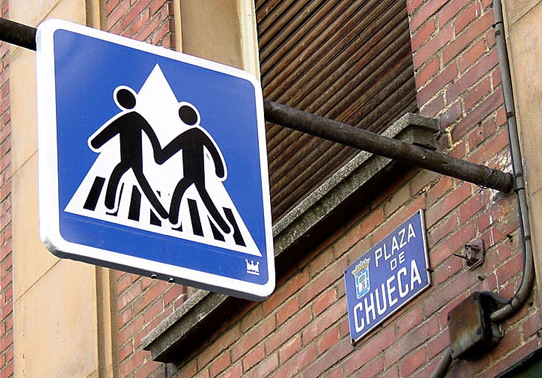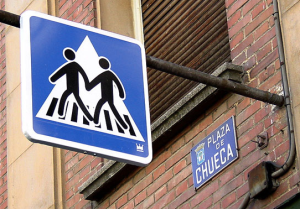I went to a concert last Thursday with Maria, the girl who owns my apartment. The group, Marco Fernandez and the Backstabbers, consisted of a translator as lead vocalist, two of his friends from school on guitar and drums, a pretty brunette who occasionally pushed the keyboard to no audible effect, and a bassist who looked like a cross between Ted Kennedy and Jack White.


The club was misty with smoke: the ban which has recently illegalized the sacred pasttime of smoking in a French café has not spread as far as the Iberian peninsula. Marco Fernandez spent much of the forty minute set pulling up the back of his jeans, which despite being stretched like the skin of a chorizo across his thighs kept sliding downwards to reveal shiny black boxer briefs. He also occasionally fell on his knees and started beating the floor, all the while shouting into the microphone with the intensity of a Spice Girls fan on the reunion tour. He sang in a Spanish-accented English which I found almost incomprehensible, except for the word ‘quiver’, which he used more often than I imagined necessary. I asked Maria why he chose to sing in English rather than his mother tongue.
‘It’s the only way to be famous, really. And why make music other than to be famous?’
I thought that was a novel idea. In my world, you make music either because you love it or as a way to stave off the reality of going into a 9-5 job for as long as possible. But Maria was getting at a crucial point of Spanish pop culture: most of it is American/British import. Britney is still getting plenty of airtime over here, along with her evil twin Amy Winehouse.Operacion Triunfo, the Spanish version of Pop/American Idol, was nearly won by an American, and almost all the songs on the show were in English. Clothes with English graphics are clearly hip, regardless of what they say: I saw a girl on the way to work this morning wearing a shirt that said ‘Push fashion enchantment doors blister future,’ which either holds deep mystical significance or shows the inefficacy of online translators. In a twisted way, it makes me feel better. We Americans have spent our entire history trying to emulate and improve upon European culture; it’s strangely satisfying to see them return the interest.
But back to Marco Fernandez and the Backstabbers. Jack White/Ted Kennedy was a friend of Maria’s, and he came to hang out with us after the concert. I asked him his name.
‘Me llámo Emmanuel, pero puedes llámame Mortimer, o Señor la rata,’ he said, and growled at me. Literally, he growled.
‘Did he just say his name was Emmanuel, but I should call him Mortimer or Mr. Rat?’ I asked Maria.
She nodded. ‘He’s so cool. He’s the best of the Backstabbers.’
It turns out Maria has a rock band too. She told me something about it one of the first nights I was living in the apartment, but, with my lack of proficiency in Spanish, I thought she said she was trying to form one. Which made sense, given the sort of sounds I heard coming from their rehearsals in the room down the hall. I’ve never actually heard a stuck pig, but it might sound similar.
So it was with some trepidation I went out to Nasti, the club where Maria’s band (Maria Teresa and the Double-Crossers? I didn’t catch the name) was playing, last Saturday. They put on a good show, though, if you keep in mind the theory of public presentation that seventy percent is how you look, twenty percent is how you sound, and ten percent is what you say. Giving them the benefit of the doubt on the words, they were eighty percent of the way there.


